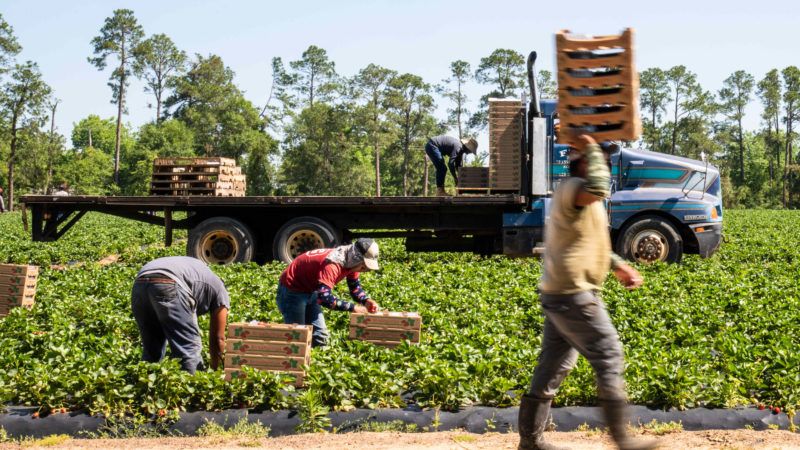COVID-19 Immigration Restrictions Make Labor and Food Shortages a Real Possibility
We need to be careful, but we also need people to bring food from fields to our tables

Farm groups are warning that immigration restrictions put in place this month by the Trump administration could lead to food shortages down the road, Reason contributor Sean Higgins reported this week in the Washington Examiner.
Last week, the U.S. closed consulates in Mexico, which halted processing of farmworker visas there under the H-2A visa program. Earlier reports had suggested H-2A visas "would continue to be processed."
The U.S. and Mexico also agreed last week to close the border temporarily to all but essential traffic, though commercial transport and workers with legal work permits are still free to traverse the border. The moves also come as protesters in Mexico blocked a border crossing this week to demand visitors from the United States be tested for the coronavirus before being allowed into Mexico.
The H-2A visa program lets U.S. farmers, ranchers, and other agricultural producers that anticipate labor shortages bring on foreign workers temporarily to fill the gaps.
"Contrary to what some might assume, these visa holders aren't unskilled labor," Higgins writes. "Modern farming involves a lot of technology, including heavy equipment, that the workers must be familiar with, as well as other skills that ordinary people won't possess."
According to 2016 Labor Department data, more than 165,000 agricultural labor positions were certified that year under the H-2A program. More than half of those positions were based in Florida, North Carolina, Georgia, Washington, and California. Leading crops harvested by H-2A workers include berries, apples, melons, sweet potatoes, lettuce, and corn. More than nine out of every 10 farmworkers holding an H-2A come from Mexico.
While workers who've applied for an H-2A visa in the past year are eligible to renew, Higgins cites agricultural sources who say such renewals typically account for only around half of annual applicants. Unless many more existing visa holders re-apply than normally do, then, or the Trump administration changes course, the U.S. could face crippling farm labor shortages. And those labor shortages could, in turn, translate to food shortages at U.S. grocery stores.
According to a primer from the American Farm Bureau Federation, the nation's largest farm lobby, Congress passed the Immigration and Nationality Act, which gave rise to the H-2 visa process, in the early 1950s. The H-2A program has grown dramatically in recent years, with some U.S. businesses that rely on H-2A applicants seeing their demand for guest workers double in recent years.
Secretary of State Mike Pompeo, acknowledging the potential impact of a farm labor shortage, says the administration will "do everything we can to keep that part of our economic lifeblood working."
Meanwhile, many are downplaying the risk of any potential food shortages.
"Even if the COVID-19 pandemic stretches over months[,] there will be no big food shortages, especially on staples like milk, eggs, cheese, bread[,] and meat," CNBC reported last week. The New York Times also reported (as did Politico) that domestic food supplies and production are on solid ground. Rodney McMullen, CEO of Kroger, told the Motley Fool that food shortages are unlikely given that "there's plenty of food in the supply chain."
But, as Forbes reported last week, producers and sellers are facing many challenges, including "a number of weak spots in the food transportation system that could be aggravated by the increased demand for food." And though some grocers are thriving right now, they're also struggling to keep up with consumer demand.
Predictably, the U.S. isn't the only country facing food-supply hurdles due to COVID-19. Europe, for example, is facing similar labor challenges, which are giving rise to fears of food shortages there, too.
COVID-19 has caused countries to take a variety of steps to reassess their food supplies. Some countries, for example, have begun to halt food exports. The Guardian reported this week that the United Nations warns that worker shortages, coupled with "protectionist policies"—including tariffs and export bans, including ones adopted in Kazakhstan, Vietnam, and Russia—could begin to cause food shortages around the globe "within weeks." Global supply chains, like those in the U.S., are also being tested.
But these fears aren't universal. Thailand, for one, is downplaying fears of any food shortages in that country.
Ultimately, the U.S. could still avoid potential farm labor shortages if, say, the Trump administration reverses course or—less likely, given the need for skilled labor—if recently unemployed U.S. workers fill the available farm positions.
The Trump administration's odious stance against Mexico, Mexicans, and immigrants in general casts a cloud of suspicion over its immigration and border restrictions. Vox reported last week that some observers are concerned the Trump administration is "using the crisis as a potential excuse to further restrict travel across the southern border. " On the other hand, temporary border restrictions to battle COVID-19 make sense. They also apply at this point to people in every non-U.S. country—whether Canada, Mexico, China, England, or beyond—and vice versa.
As soon as those restrictions can be lifted safely and our borders can be reopened, they should be. American farmers and consumers depend on it.


Show Comments (114)